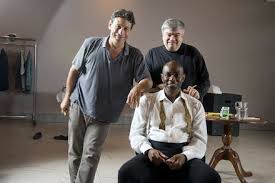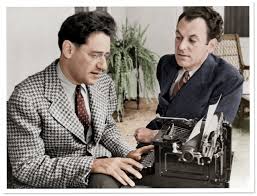The pennant for Satchmo at the Waldorf is now flying in front of the Westside Theatre. It looks too good to be true:

So you want to see a show?
Here’s my list of recommended Broadway, off-Broadway, and out-of-town shows, updated weekly. In all cases, I gave these shows favorable reviews (if sometimes qualifiedly so) in The Wall Street Journal when they opened. For more information, click on the title.
BROADWAY:
• A Gentleman’s Guide to Love & Murder (musical, PG-13, reviewed here)
• Matilda (musical, G, most performances sold out last week, reviewed here)
• No Man’s Land/Waiting for Godot (drama, PG-13, playing in rotating repertory, closes Mar. 30, reviewed here)
• Once (musical, G/PG-13, reviewed here)
• Outside Mullingar (comedy, PG-13, closes Mar. 16, reviewed here)
OFF BROADWAY:
• Avenue Q (musical, R, adult subject matter and one show-stopping scene of puppet-on-puppet sex, reviewed here)
• The Fantasticks (musical, G, suitable for children capable of enjoying a love story, reviewed here)
CLOSING SOON OFF BROADWAY:
• Hamlet/Saint Joan (drama, G/PG-13, remounting of off-Broadway productions, playing in rotating repertory, closes Mar. 9, original productions reviewed here)
CLOSING SOON IN ORLANDO, FLA.:
• The Life and Adventures of Nicholas Nickleby, Parts I and II (drama, G/PG-13, playing in rotating repertory, closes Mar. 9, reviewed here)
CLOSING NEXT WEEK IN GLENCOE, ILL.:
• Port Authority (drama, PG-13, closes Mar. 2, reviewed here)
CLOSING NEXT WEEK IN WEST PALM BEACH, FLA.:
• Old Times (drama, PG-13, closes Mar. 2, reviewed here)
Almanac: Constant Lambert on technique
“Those who live for technique are killed by technique.”
Constant Lambert, Music Ho!
Full circle
 Am I nervous about the fast-approaching opening night of Satchmo at the Waldorf? Knowing what I know about the utter unpredictability of the theater business, I’d be crazy if I weren’t. Mostly, though, I just walk around feeling slightly distracted. It isn’t exactly a pleasant sensation, but it could be a whole lot worse. (It’s a good thing, though, that I’m not driving anywhere these days. I shudder at the thought of finding myself behind the wheel of a car right now.)
Am I nervous about the fast-approaching opening night of Satchmo at the Waldorf? Knowing what I know about the utter unpredictability of the theater business, I’d be crazy if I weren’t. Mostly, though, I just walk around feeling slightly distracted. It isn’t exactly a pleasant sensation, but it could be a whole lot worse. (It’s a good thing, though, that I’m not driving anywhere these days. I shudder at the thought of finding myself behind the wheel of a car right now.)
This isn’t to say that I’m confident that Satchmo will go over in New York. I’m not, to put it very, very mildly, even though the previews have gone well so far. But I believe that I’ve done my best, such as it is, and I know that I have a singularly gifted star and director. So insofar as I can think about other things, I do. When I can’t, I work, and when I haven’t any work to do, I go to the Westside Theatre and hang out. It’s a comforting place to be, a windowless chamber cut off from the outside world whose busy occupants are wholly dedicated to the gratifying task of ensuring that the off-Broadway transfer of my first play looks and sounds as good as is humanly possible.
The closer we get to March 4, the better I see how accurately Moss Hart described what I’m feeling right now in Act One, his 1959 autobiography. It tells the stomach-churning story of how he collaborated with George S. Kaufman on Once in a Lifetime, a comedy that opened on Broadway in 1930 after much preliminary chaos and made the twenty-five-year-old Hart a celebrity in a single stroke of good fortune (preceded by a grueling year of appallingly hard work). The book describes in excruciating detail every setback and sleepless night that stood between the writing of the first draft of Once in a Lifetime and the publication of the reviews that turned it into a hit. It’s a wonderful, terrible tale whose happy ending redeems all the horrors that lead up to it.
 James Lapine, as it happens, has just turned Act One into a play, and his stage version open at Lincoln Center Theater later this season. I can’t wait to see it, not least because I’ll know by then whether Satchmo at the Waldorf is a hit, a flop, or something in between.
James Lapine, as it happens, has just turned Act One into a play, and his stage version open at Lincoln Center Theater later this season. I can’t wait to see it, not least because I’ll know by then whether Satchmo at the Waldorf is a hit, a flop, or something in between.
I read Act One for the first time when I was a teenager. I’d just joined the high-school drama club, and Hart’s tales of theatrical derring-do filled me with dreams of a life on the stage, dreams that were soon supplanted by a different, more practical set of music-related fantasies. To be sure, I continued to work on shows until I graduated from college, but then I put the theater behind me–permanently, I assumed.
Even after I became the drama critic of The Wall Street Journal, it never occurred to me, not even for a moment, that a time would come when I’d know exactly how Moss Hart felt as he waited for Once in a Lifetime to open:
I walked toward Once in a Lifetime for the last time–that final walk every playwright takes toward his play, knowing that it is no longer his, that it belongs to the actors and the audience now, that a part of himself is to be judged by strangers and that he can only watch it as a stranger himself. The main consideration of his day, the keystone that has dictated his every waking moment, the cause that has enlisted his being for all these months, is at an end. He moves toward his destination with mixed emotions–it is the completion he has sought, but there is the ache of finality in it. He is at last a spectator–a spectator with the largest stake in the gamble of the evening, but a spectator nonetheless.
No, it isn’t pleasant. But like I said, it could be worse.
Snapshot: a Leonard Bernstein premiere
Leonard Bernstein conducts the premiere performance of his Prelude, Fugue, and Riffs on Omnibus in 1955:
For a partial list of the members of the studio band, go here.
(This is the latest in a series of arts-related videos that appear in this space each Monday and Wednesday.)
Almanac: Constant Lambert on individuality
“The artist who is one of a group writes for that group alone, whereas the artist who expresses personal experience may in the end reach universal experience.”
Constant Lambert, Music Ho!
Lookback: on reading biographies backwards
From 2004:
Without exception, my friends are puzzled by my more than occasional practice of reading biographies from back to front. It puzzles me, too, even though I’ve been doing it for years, and I can’t offer any explanation, however theoretical, for a habit that at first, second, and third glances makes no sense. All I can tell you is that for some reason not yet accessible to introspection, I often prefer to read about a person’s life in reverse chronological order, starting with his death and working backwards to his birth….
Read the whole thing here.
Almanac: Constant Lambert on depression
It’s no good escaping your doom
By taking a ticket to Spain;
The bulging portmanteaux of gloom
Will arrive by a later train.
Constant Lambert, undated quatrain
